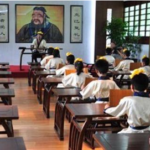Adriano Souza Senkevics, Researcher at the National Institute of Educational Studies and Research Anísio Teixeira (Inep), Brasília, DF, Brazil.
 The democratization of higher education in Brazil has resulted in a tension between a meritocratic logic of action and a pragmatic one, reflected in the experiences of young people transitioning to university. Some adopt a “turning point” stance, accepting any degree or occupation as a form of social mobility, while others pursue specific careers, believing in individual effort as the key to success.
The democratization of higher education in Brazil has resulted in a tension between a meritocratic logic of action and a pragmatic one, reflected in the experiences of young people transitioning to university. Some adopt a “turning point” stance, accepting any degree or occupation as a form of social mobility, while others pursue specific careers, believing in individual effort as the key to success.
However, repeated failures often lead them down a more flexible and practical path. The inclusion of these young people in higher education challenges established norms, highlighting the structural barriers in Brazilian society that limit the integration of masses of young people into this level of education. These are some of the conclusions of the study recently published in the journal Educação em Revista entitled Youth and access to higher education: on the non-place of the preparatory course student.
The fieldwork was carried out in community courses for college entrance examination (the so-called “popular courses”) in the Federal District (Distrito Federal, DF) in 2018 by Adriano Senkevics, under the guidance of Marília Carvalho. It is part of a doctoral thesis presented to the Faculty of Education of the Universidade de São Paulo and recognized with the Capes Thesis Award in Education and the Capes Thesis Grand Prize in Humanities. It is also part of a broader context of trying to understand the transformations in access to higher education between 1991 and 2020. This period encompasses a period of great change in which Brazil migrated from an “elite system” to a “mass system”, with all the challenges that this shift implies for the right to education and the lives of young people and their families.
Figure 1. Map of the Administrative Regions of the Federal District Inhabited by the Research Participants.
In this context, young people from the lower classes who are studying for university entrance exams experience a kind of non-place in the transition from secondary to higher education. Beyond the educational dimension, contemporary reality is the scenery of erosion of traditional notions of career and salary, driven by a context of unstable and precarious work – even for graduates – which intensifies the phenomenon of “turning point” (“viração”, in Portuguese), a term very well developed by Ludmila Abílio (2014).
Young people from working class backgrounds, when trying to access higher education, reveal the precariousness of their social positions in a scenario where the possibility of building a stable future is becoming increasingly difficult. This scenario is in line with Carmen Leccardi’s (2005) conclusions that young people live in an “extended present”, especially for those who experience the “limbo” of an uncertain position in which they don’t yet have a work permit or a student card.
Thus, the article starts from the perspectives of young people from Brasília, DF to shed light on how a macro-structural phenomenon in Brazilian society – the evolution of democratization of access to higher education – is experienced by individuals who are, in their daily lives, seeking a place in an educational system that, despite never having expanded so much, seems so distant and so difficult to enter.
Finally, a few words about the open peer review process. The manuscript was evaluated by two excellent researchers who dialogued directly with the authors to clarify doubts and improve the text. Unlike sending an anonymous review, a direct interaction took place in a virtual meeting, which added up to a text with careful considerations. This innovative experience allowed for a very productive exchange between authors and reviewers and helped to validate the main conclusions of the manuscript.
Educação em Revista Special Week
- Contributions of Educação em Revista for the advance of Open Science in Brazil
- Educação em Revista celebrates 39 years of publishing academic research: interview with the Editor
- Collective constructions: open peer review of an article on indigenous literature
- Pedagogical practices for student retention
- How do young people experience the democratization of access to higher education?
- Web platform can revolutionize the essay correction process
- The Open University of Brazil in the management of student permanence in Pedagogy courses
- Educação em Revista: editorial challenges and scientific possibilities
References
ABÍLIO, L. Sem maquiagem: o trabalho de um milhão de revendedoras de cosméticos. São Paulo: Boitempo/Fapesp, 2014.
LECCARDI, C. Para um novo significado do futuro: mudança social, jovens e tempo. Tempo Social [online]. 2005, vol. 17, no. 2, pp. 35-57 [viewed 06 June 2024]. https://doi.org/10.1590/S0103-20702005000200003. Available from: https://www.scielo.br/j/ts/a/3p3mXn5TfgkkGSnWsXZ3zxr/
To read the article, access
SENKEVICS, A.S. and CARVALHO, M.P. Juventude e acesso ao ensino superior: sobre o não lugar de vestibulando. Educação em Revista [online]. 2023, vol. 39, pp. 1-19 [viewed 06 June 2024]. https://doi.org/10.1590/0102-469841621. Available from: https://www.scielo.br/j/edur/a/hj8XkJcXbKfbnGncvrccxCy/
External links
Educação em Revista – EDUR: www.scielo.br/edur/
Educação em Revista – Site | Instagram | Twitter | LinkedIn
Adriano Senkevics – Perfil do autor: https://sites.google.com/view/asenkevics/
Translated from the original in Portuguese by Lilian Nassi-Calò.
Como citar este post [ISO 690/2010]:


















Recent Comments